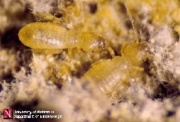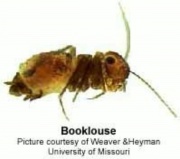Difference between revisions of "Booklouse"
Jump to navigation
Jump to search
(username removed) |
(username removed) |
||
| Line 2: | Line 2: | ||
== Description == | == Description == | ||
| − | Tiny, wingless, biting insects, ''Liposcelis corrodens Heymons'', of the order Psocoptera. Booklice (nymphs and adults) feed on [http://cameo.mfa.org/materials/fullrecord.asp?name=cellulose cellulose] and [http://cameo.mfa.org/materials/fullrecord.asp?name=carbohydrate carbohydrates], such as stored [http://cameo.mfa.org/materials/fullrecord.asp?name=flour flour], [http://cameo.mfa.org/materials/fullrecord.asp?name=paper paper], [http://cameo.mfa.org/materials/fullrecord.asp?name=starch starch], and books. They especially like [http://cameo.mfa.org/materials/fullrecord.asp?name=mold | + | Tiny, wingless, biting insects, ''Liposcelis corrodens Heymons'', of the order Psocoptera. Booklice (nymphs and adults) feed on [http://cameo.mfa.org/materials/fullrecord.asp?name=cellulose cellulose] and [http://cameo.mfa.org/materials/fullrecord.asp?name=carbohydrate carbohydrates], such as stored [http://cameo.mfa.org/materials/fullrecord.asp?name=flour flour], [http://cameo.mfa.org/materials/fullrecord.asp?name=paper paper], [http://cameo.mfa.org/materials/fullrecord.asp?name=starch starch], and books. They especially like [http://cameo.mfa.org/materials/fullrecord.asp?name=mold%20%28fungus%29 mold], [http://cameo.mfa.org/materials/fullrecord.asp?name=mildew mildew], and [http://cameo.mfa.org/materials/fullrecord.asp?name=fungus fungi]. Eggs hatch into nymphs in 6 to 9 days and the full life cycle takes 24 to 38 days. The adult booklouse is a grayish white color and it reaches sizes of 1-2 mm. They have flattened bodies with relatively large mouths. Booklice prefer damp, constant conditions, and can often be killed by warming and drying their environment. |
[[File:image6_booklouse.jpg|thumb|Booklouse]] | [[File:image6_booklouse.jpg|thumb|Booklouse]] | ||
| Line 13: | Line 13: | ||
* ''Van Nostrand's Scientific Encyclopedia'', Douglas M. Considine (ed.), Van Nostrand Reinhold, New York, 1976 | * ''Van Nostrand's Scientific Encyclopedia'', Douglas M. Considine (ed.), Van Nostrand Reinhold, New York, 1976 | ||
| − | * | + | * Random House, ''Webster's Encyclopedic Unabridged Dictionary of the English Language'', Grammercy Book, New York, 1997 |
* ''The American Heritage Dictionary'' or ''Encarta'', via Microsoft Bookshelf 98, Microsoft Corp., 1998 | * ''The American Heritage Dictionary'' or ''Encarta'', via Microsoft Bookshelf 98, Microsoft Corp., 1998 | ||
| Line 19: | Line 19: | ||
* ''Encyclopedia Britannica'', http://www.britannica.com Comment: "louse" [Accessed April 9, 2002]. | * ''Encyclopedia Britannica'', http://www.britannica.com Comment: "louse" [Accessed April 9, 2002]. | ||
| − | * | + | * Lynda A. Zycherman, J.Richard Schrock, ''A Guide to Museum Pest Control'', FAIC and Association of Systematics Collections, Washington DC, 1988 |
| − | * | + | * Matt Roberts, Don Etherington, ''Bookbinding and the Conservation of Books: a Dictionary of Descriptive Terminology'', U.S. Government Printing Office, Washington DC, 1982 |
| − | * | + | * G.Caneva, M.P.Nugari, O.Salvadori, ''Biology in the Conservation of Works of Art'', ICCROM, Rome, 1991 |
[[Category:Materials database]] | [[Category:Materials database]] | ||
Revision as of 07:23, 24 July 2013
Description
Tiny, wingless, biting insects, Liposcelis corrodens Heymons, of the order Psocoptera. Booklice (nymphs and adults) feed on cellulose and carbohydrates, such as stored flour, paper, starch, and books. They especially like mold, mildew, and fungi. Eggs hatch into nymphs in 6 to 9 days and the full life cycle takes 24 to 38 days. The adult booklouse is a grayish white color and it reaches sizes of 1-2 mm. They have flattened bodies with relatively large mouths. Booklice prefer damp, constant conditions, and can often be killed by warming and drying their environment.
Synonyms and Related Terms
book louse; booklice; book lice; book mites (incorrect); psocid; pscocid (sp)
Authority
- Van Nostrand's Scientific Encyclopedia, Douglas M. Considine (ed.), Van Nostrand Reinhold, New York, 1976
- Random House, Webster's Encyclopedic Unabridged Dictionary of the English Language, Grammercy Book, New York, 1997
- The American Heritage Dictionary or Encarta, via Microsoft Bookshelf 98, Microsoft Corp., 1998
- Encyclopedia Britannica, http://www.britannica.com Comment: "louse" [Accessed April 9, 2002].
- Lynda A. Zycherman, J.Richard Schrock, A Guide to Museum Pest Control, FAIC and Association of Systematics Collections, Washington DC, 1988
- Matt Roberts, Don Etherington, Bookbinding and the Conservation of Books: a Dictionary of Descriptive Terminology, U.S. Government Printing Office, Washington DC, 1982
- G.Caneva, M.P.Nugari, O.Salvadori, Biology in the Conservation of Works of Art, ICCROM, Rome, 1991

